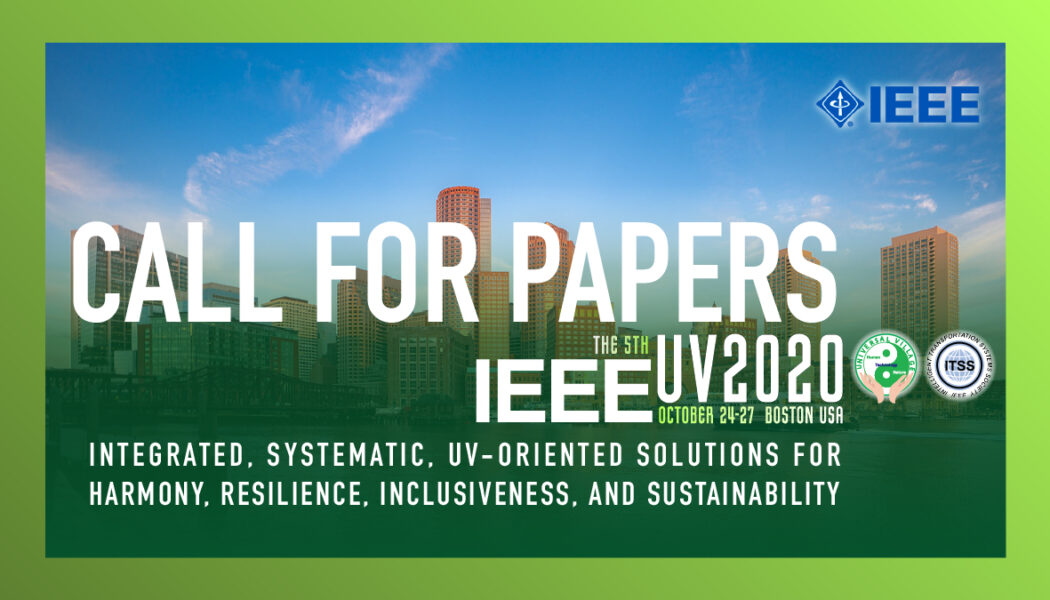Sponsored by IEEE, the 5th International Conference on Universal Village (UV2020) will be held from October 24th-27th, 2020, in Boston, USA.
Universal Village (UV) is a new concept proposed by MIT’s Universal Village Program. UV exemplifies an ideal future society that pursues harmony between humans and nature through the wise use of technologies. The International Conference on Universal Village calls for collective efforts from world-renowned experts across multidisciplinary fields to collaborate beyond traditional field boundaries. Previous UV conferences (UV2013, UV2014, UV2016, and UV2018) were groundbreaking international venues that inspired successful collaboration among governments, academia, industries, and civil society.
With the theme of “Integrated, Systematic, UV-Oriented Solutions for Harmony, Resilience, Inclusiveness, and Sustainability,” UV2020 calls for papers featuring the following topics:
Coordinated Development to achieve harmony between humans and nature
- Session 1-A: Vision for Universal Village and UV Indices
- Vision for Universal Village
- UV Indices: Quantitative Indications of Cities’ Smartness, Efficiency, Safety, Environmental Qualities, and Inclusiveness
- Session 1-B: Development Status of Universal Village
- Development status of current smart cities in different countries
- Discussion of limitations and challenges
- Session 1-C: Evaluation of Smart City-Related Methods, Technologies, and Systems
- Evaluation of current methods and technologies for smart city subsystems
- Smart Home and Community
- Smart Medicine and Healthcare
- Intelligent Transportation, Urban Planning, and Crowd Management
- Smart Energy Management
- Smart City Infrastructure
- Smart Response Systems for City Emergencies
- Smart Environmental Protection
- Smart Humanity
- Analysis of smart cities’ impact factors and evaluation of current methods and technologies from these perspectives:
- Information flow
- Material cycle
- Lifestyle: issues such as food waste
- Community
- Subsystem coordination and interaction analysis: Analysis of the mutual interactions among smart cities’ subsystems and evaluation of the system coordination of current methods and technologies
- Evaluation of current methods and technologies for smart city subsystems
Seek integrated, resilient, human-centered, sustainable and environment-friendly solutions under the concept of Universal Village
- Session 2-A: Systematic and Integrated Frameworks for UV Subsystems and Contributing Factors
- Session 2-B: Intelligent Modeling, Simulation, and System Analysis
Category III – Category X: UV Technology Development
Promote diversity, inclusiveness, mobility, connectivity, and intercommunication to create harmony
- Session 3-A: Intelligent Transportation, Urban Planning, and Crowd Management
- Intelligent vehicles; interconnected transportation systems
- Traffic control; crowd management; smart parking; urban planning
- Smart logistics and distribution services; last-mile delivery via robots or drones
- Session 3-B: Smart City Infrastructure
- Smart facilities; smart construction; smart lighting/heating/cooling/ventilation systems; smart sewerage and sanitation systems; smart water and waste management
- Coordinated city infrastructure development and operational management; smart infrastructure lifecycle management; predictive analytics for identifying infrastructure vulnerability
- Session 3-C: Information Flow, Communication, and Networks
- Smart data acquisition; mobile sensing; crowdsourcing; the Internet of Things; seamless wireless networks; information and communication technology (ICT) infrastructure
- Information integration; information storage, sharing, circulation, and visualization; cloud service
- Solutions for security, safety, reliability and privacy issues
- Session 3-D: Smart Response Systems for City Emergencies
- System vulnerabilities identification; crisis prevention and city robustness reinforcement
- Emergency (natural disasters, crimes, accidents, etc.) prediction, detection and management; cyber-security; smart alerting and hierarchical information collection and distribution; active disaster response and recovery
- Session 4-A: Renewable Energy and Smart Energy Management
- Renewable energy capture and conversion, emerging technologies
- Solar energy: photovoltaics, solar thermos
- Wind energy: wind turbine materials and novel designs
- Hydrogen energy: solar splitting water, fuel cells
- Other energies: biomass, renewable natural gas, hydroelectric energy, blue energy
- Energy storage devices and technologies (batteries, supercapacitors, and fuel cells)
- Smart grids; transmission infrastructure; integrated energy management for high efficiency and zero-emission; theoretical simulations of renewable energy and its applications; smart meters; demand response management (DRM)
- Resilient operations against disturbances, unexpected errors, accidents, physical and cyber-attacks, and natural disasters
- Renewable energy capture and conversion, emerging technologies
- Session 4-B: Smart Materials and Devices
- Smart materials for advanced electronic devices (sensors, actuators, transducers)
- Smart materials for energy conversion (piezoelectric, magneto-elastic, thermoelectric, electrostriction)
- Advanced intelligence devices and systems
- Artificial Intelligence (AI) for materials development
- Session 5-A: Smart Manufacturing
- Cloud manufacturing
- Cloud-edge collaboration in manufacturing
- Additive manufacturing and robotics
- Planning and scheduling of manufacturing tasks
- Quality detection and control
- Computer vision and other AI technologies in manufacturing
- Session 5-B: Smart Agriculture
- Vertical farming; smart crop/soil management; climate-smart agriculture
- Smart sensing, monitoring, IoT and decision-making in agriculture
- Session 6: Ecological and Environmental Systems, Material Cycles
- Environmental protection: exhaust/wastewater/solid waste management; pollution control (air/water/soil; light/noise/radiation); effective microorganism technology; green roofs
- Challenges and solutions for climate change; restoration and protection of ecosystems; ecological economics and strategies; ecological informatics and acoustics
- Material cycles: material reuse; the second-hand market; smart recycling
- Session 7-A: Smart Homes
- Smart appliances and devices; smart windows; intelligent deformation furniture; smart inventory management; smart home OS
- Safety and security; self-adaptive home-emergency response systems
- Smart life; fashion AI; home gardening and agriculture
- Session 7-B: Mobility, Connectivity, and Innovative Lifestyles
- Integrated and technology-driven solutions to improve the quality of life: quantified self devices and self-tracking technologies; smart textiles; VR/AR-based sports, entertainment and other activities; human-centered transportation, smart mobility and seamless transit systems; smart agents and human-computer interaction
- New lifestyles to reduce energy consumption and emissions: shared mobility and other new lifestyles made possible by the sharing economy; virtual tours; work from home; electronic surveillance
- Changing trends in cultures/technologies/lifestyles
- Session 8-A: Advanced devices/systems for healthcare monitoring
- Emerging types of wearable sensors, materials, and smart fabrics
- Wearable device applications for medical diagnostics and screening
- Flexible, stretchable, printed, and hybrid electronics
- Session 8-B: Smart Medicine and Smart Healthcare
- Pervasive and non-invasive health-monitoring; telehealth; personalized healthcare and wellness management; smart diet and exercise; mental health
- Intelligent nursery and senior care; assistive technologies for mobility-challenged residents
- Public health: alternative medicine; community/rural/urban health; epidemic control and personal hygiene; equity and ethical issues
- Session 9-A: Urbanization and Smart Communities
- Urbanization: impact and challenges; geographical, cultural, and political factors
- Smart communities and neighborhoods; social media and support groups; community resource management; supporting infrastructure; data platforms and community clouds
- Session 9-B: Smart Government and Social Services
- Smart government: smart administration, regulation, policy and law; participatory governance; smart resource allocation
- Smart social services and social networks; smart education/training; civic engagement
- Session 9-C: Integrated Solutions for Smart Humanity
- New legal, social, and ethical challenges posed by applications of AI; integrated solutions: quantified analysis for the safety and ethics of intelligent systems; the social responsibility of enterprises; establish legal, regulatory and ethical frameworks for development of AI
- Integrated solutions to promote diversity, inclusiveness, fairness, and the preservation of cultural heritage
- Ecological/environmental/humanistic/organizational psychology; persuasive technology
- Adaptive development strategies for various geographic regions at different developmental phases and people of different ages with diverse technology and cultural backgrounds
- Session 10-A: Data Management and Processing
- Data cleaning; data fusion and integration; data quality and integrity; data visualization; data mining; big data analytics
- Human-centered/cognitive/mobile/cloud computing
- Urban informatics; data-driven monitoring, analysis, prediction, planning and decision making; real-time big data services; smart city control centers; application benchmarking and city indices; knowledge management (KM)
- Session 10-B: Algorithm Development and Analysis
- Signal processing and understanding (image/video/audio/speech/natural language); semantics interpretation; multimodal sensor fusion and city monitoring; diagnostic algorithms
- AI, machine learning and interpretability; fairness, accountability, privacy, transparency, and ethics; deep-fake detection
- Intelligent modeling, simulation, prediction and optimization; system dynamics; system control
- Session 11-A: Coordinated UV Solutions for Epidemic Prevention and Control
- Crowdsourcing, data collection, and visualization
- Epidemic prediction and contact tracking
- Coordinated operational management across all levels during emergencies; smart resource allocation; segregation control; smart medical waste processing
- Session 11-B: Coordinated UV Solutions for Trash and Scrap Collection, Processing, Reuse, and Recycling
- Crowdsourcing, data collection, and visualization for material cycles
- Smart residential trash and industrial scrap collection and transportation: smart trash cans and their optimal placement; smart garbage trucks; smart trash and scrap collection systems and their interactions with cultural and economic factors; development of innovative lifestyles, public awareness and community engagement
- Material cycles optimization: smart waste management; smart trash and scrap processing, reuse and recycling; smart platform development for coordinated information sharing between smart recycling, user feedback on products and smart manufacturing
- Session 12-A: UV City Forum
- Reflections on urbanization and its unintended consequences
- Current development status and challenges of smart cities; vision of future UV development
- Collaboration among governments, academia, industries, and civil society
- Session 12-B: UV Student Forum
- UV student research, innovations, and discussions
- Preserve cultural heritage in the process of urbanization
- Bridge the generation gap and promote the understanding across diverse groups with the aid of UV technologies
- Explore future lifestyles for sustainable happiness
- Session 12-C: UV Industry and Entrepreneurship Forum
- Opportunities and challenges of emerging technologies; international cooperation on technology innovation
- Entrepreneurship, economic development, and investment for UV technologies; innovative business models
- Adaptive development strategies to promote inclusiveness, diversity, and equality
- Session 13-A: Coordinated UV Solutions for Epidemic Prevention and Control
- Session 13-B: Coordinated UV Solutions for Trash Collection, Reuse, and Recycling
- Session 13-C: General Topics
- Session 14-A: UV Posters
- Session 14-B: UV Exhibition
Organizations/Companies/Startups are welcome
- Session 15-A: New legal, social, and ethical challenges posed by applications of AI; integrated solutions: quantified analysis for the safety and ethics of intelligent systems; the social responsibility of enterprises; establish legal, regulatory and ethical frameworks for development of AI
- Session 15-B: Lifestyle innovations enabled by emergent technologies: how to reach a balance between improving the quality of life, reducing energy consumption and emissions, and promoting harmony, inclusiveness, resilience and sustainability
- Session 16: UV Introduction
IMPORTANT DATES
| Submission system open | March 20, 2020 |
| New session proposals submissions due | May 15, 2020 |
| Abstract submissions due (Optional) | May 31, 2020 |
| Notification of abstract acceptance | June 15, 2020 |
| Paper/Poster abstract and outline submissions (*)(Highly Suggested) | September 20, 2020 |
| Full-length paper/poster submissions due | September 30, 2020 |
| Notification of full-length paper/poster acceptance | October 7, 2020 |
| Final manuscripts/presentation materials due | October 20, 2020 |
* Due to the unexpected situations authors may experience/face during the COVID-19 pandemic, UV2020 Organizing Committee has postponed the due date of paper submission to September 30. To facilitate our process of reviewing and program arrangements, it is highly suggested that you submit your paper abstracts and paper outlines in a WORD/PDF file by September 20. For authors who can submit full-length papers early, please kindly do so. Your cooperation will be greatly appreciated.



